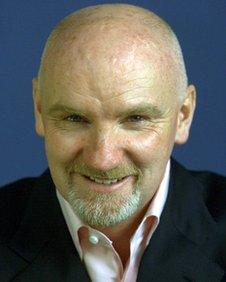Power of policy-making in the hands of philanthropists
- Published

Money talks: Writing big cheques can make philanthropists very powerful in shaping policy ideas
Deciding to give away a lot of your wealth to good causes is an admirable act, but exactly how powerful does it make you?
Being a philanthropist on a grand scale - plugging millions or even billions into causes you support - can effectively mean that one person is setting the priorities in that field.
"The rich have a great deal of power that can be exercised and can reshape the character of a country," says writer and journalist George Monbiot, who is also a social justice and environmental campaigner.
"I am in favour of philanthropy as long as it does not allow too much power for the giver over the political system."
But that is exactly what ends up happening, he says: "You are diverting money into areas which suit your political interests and away from those that don't."

Sir Tom Hunter says he knows best how to invest his money
Moreover, he says, philanthropy is no substitute for taxation, which he says is the best means of making sure that money goes to those who need it most.
'It's my money'
But philanthropist Sir Tom Hunter, who has put more than £50m of his own money towards improving education and fighting poverty, says as long as rich people pay their taxes, they should be able to do what they want with their money.
And he disagrees with the idea that the government knows better how to spend his money than he does.
"I work very hard for the money I earn. I pay my UK taxes. What's left over - well, he who has the pesos has the say so. Why should anybody tell me how to spend my money?"
But should rich people really be able to shape national and global policies?
Similar schools agenda
Many in the US believe that there is a lack of differing views in the American education system as a result of funding from large charitable foundations.
Diane Ravitch, research professor of education at New York University and an education historian, says it is "troubling" that the Gates, Broad and Walton Family foundations - all big education donors - have the same priorities.
"They all support an agenda that is remarkably similar: privately managed charter schools; high-stakes testing; evaluating teachers by the test scores of their students; top-down, centralised decision-making by the federal government, the state government or the mayor; disregard for teacher experience or credentials or degrees."
Like Mr Monbiot, she has concerns about the influence of these foundations on the political system.
"They are all promoting a free-market approach to education, although they may not use that terminology," she says.
"In the past, our great philanthropies carried out demonstration projects in [the] hope of swaying government policy. Now government policy and foundation policy are intertwined, without any evidence to support its efficacy."
The Walton Family Foundation, however, is steadfast in its belief that its contributions are helping to improve US schools.
"We invest in organisations that empower parents. When parents are empowered with choices in their child's education, a competitive dynamic emerges that inspires the broader public school system to improve," says the organisation's Daphne Moore.
"Every student should have access to a school that meets their individual needs. That is why the foundation invests in creating quality education opportunities regardless of school type - traditional district schools, private schools or public charter schools."
Gates effect
When it comes to looking at global health, there is no denying the impact the Bill and Melinda Gates Foundation has had.
Since 1994 the foundation has contributed $15.3bn (£9.7bn) towards global health programmes, including research into and treatment of HIV/Aids, malaria and tuberculosis. It is responsible for well over 60% of all philanthropic global health spending.
"The good news is there's this phenomenal amount of money out there that wasn't there before, and it is extremely well-intentioned money. There is no hidden agenda," says Laurie Garrett, senior fellow for global health at the Council on Foreign Relations.

The Gates Foundation has ploughed billions into the fight against HIV
"But on the bad side, by virtue of its scale, the Gates Foundation has driven a lot of other players off the field."
In other words, if you can't compete with the Gateses, why bother even trying?
"The thing is, Gates just so dwarfs everything else, it looks like everything else is being ignored," she says.
"So many NGOs (non-governmental organisations) are dependent on Gates money. So if the focus of the moment is rolling out anti-retrovirals [used to treat HIV] then everything starts to follow that money - university research, NGOs and other foundations. There is a pile-on. So I see it as a far more complex problem than it might have looked."
Debate
But is there any way of actually limiting the power of philanthropists?
Probably not. After all, people are free to fund whatever they want. And when there are noble efforts to address social problems, perhaps we shouldn't want to impose curbs.
But no-one elects the rich and in democracies there is a tension between the right of the wealthy to spend their money as they see fit and the desire of politicians to exercise their mandate to implement what they believe to be the will of the people.
And the debate opens up when views differ on how to achieve these goals and on which goals actually matter, and concerns are raised when individuals or individual organisations are seen to be dominating the field.
It is a tension which only multiple sources of funding - either private or private and public - can solve.